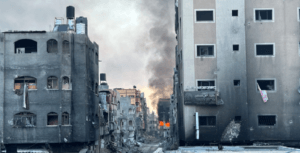Israeli Airstrikes Continue in Gaza Despite Ceasefire, Killing Nine
Israeli forces have continued airstrikes in Gaza despite a two-month-old ceasefire with Hamas. On Saturday, at least nine Palestinians were killed, with Israel claiming they were militants operating drones and planting explosives near Israeli troops. Hamas, however, argues the victims were charity workers and accuses Israel of violating the ceasefire. Since the truce began in mid-January, Israel has launched numerous strikes, killing more than 150 Palestinians, according to Hamas. The ongoing attacks serve as a reminder that a permanent peace agreement remains elusive, with both sides still in negotiations over the next steps.

Israeli Airstrikes Continue in Gaza Despite Ceasefire, Killing Nine
Even though Israel and Hamas agreed to a two-month ceasefire, Israeli airstrikes in Gaza have not stopped. On Saturday, at least nine Palestinians lost their lives in these attacks. Israel has stated that the strikes were aimed at militants who posed a threat to their soldiers. According to Israeli officials, these militants were flying drones and planting explosives near Israeli troops. However, Hamas has a different story. They say the people killed were actually working for a charity and were not involved in any violent activities. Hamas has accused Israel of breaking the ceasefire agreement.
Since the ceasefire started, Israel has carried out multiple airstrikes in Gaza, resulting in several deaths. Hamas claims that more than 150 people have been killed during this period. The ongoing violence has kept the situation very tense, and there is no sign of a lasting peace agreement anytime soon.
The ceasefire was supposed to bring calm to the region, but the continued airstrikes have made life difficult for the people of Gaza. Many families are living in fear, unsure of when the next attack might happen. The constant threat of violence has also made it hard for humanitarian organizations to provide aid to those in need. Hospitals are overwhelmed with casualties, and basic supplies like food and water are running low.
Israel defends its actions by saying it is only targeting militants who are a danger to its security. They argue that the use of drones and explosives by these groups puts their soldiers at risk, and they have no choice but to respond. However, the high number of civilian casualties has raised concerns internationally. Many countries and human rights organizations are calling for an end to the violence and a return to peaceful negotiations.
Hamas, on the other hand, insists that Israel is not honoring the ceasefire agreement. They say that the attacks are unjustified and are causing unnecessary suffering to the people of Gaza. Hamas has also called on the international community to intervene and put pressure on Israel to stop the airstrikes. They believe that without external intervention, the cycle of violence will continue, and more innocent lives will be lost.
The situation in Gaza is complex, with both sides having their own version of events. While Israel claims it is acting in self-defense, Hamas accuses Israel of aggression. The truth is likely somewhere in between, but the result is the same: ongoing violence and a lack of peace. The people caught in the middle are the ones who suffer the most. Families are torn apart, homes are destroyed, and the future looks uncertain.
Efforts to reach a comprehensive peace deal have so far been unsuccessful. Both sides have deep-rooted grievances and mistrust, making it difficult to find common ground. International mediators have tried to bring both parties to the table, but progress has been slow. The lack of a lasting solution means the cycle of violence is likely to continue, with both sides blaming each other for the escalation.
In the meantime, the people of Gaza continue to live in a state of fear and uncertainty. The constant threat of airstrikes makes it hard for them to go about their daily lives. Children are unable to go to school, and parents are worried about the safety of their families. The humanitarian situation is dire, with many people lacking access to basic necessities like food, water, and medical care.
The international community has a role to play in helping to resolve this conflict. Diplomatic efforts need to be intensified to bring both sides back to the negotiating table. There needs to be a focus on finding a long-term solution that addresses the concerns of both Israel and Hamas. Only through dialogue and compromise can there be any hope of lasting peace in the region.
In conclusion, despite the ceasefire agreement, the situation in Gaza remains volatile. The continued airstrikes by Israel and the accusations from Hamas have kept tensions high. The people of Gaza are suffering the most, with many lives lost and a humanitarian crisis unfolding. The need for a comprehensive peace deal is more urgent than ever, but achieving it will require significant effort and cooperation from both sides, as well as support from the international community. Until then, the cycle of violence is likely to continue, with no end in sight.
You must be logged in to post a comment.